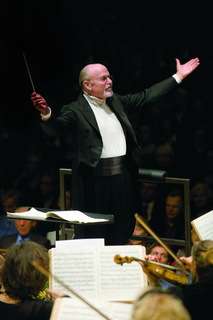|
Back
The Cycle Nears Completion Zurich
Tonhalle
09/23/2009 - & September 24, 25*
Gustav Mahler: Symphony No. 9
Tonhalle Orchestra, David Zinman (conductor) 
David Zinman (© Priska Ketterer)
David Zinman’s ongoing and highly acclaimed Mahler cycle with the Tonhalle orchestra is reaching its conclusion. After tackling the Seventh and Eighth last season, we have now reached the Ninth. One might reasonably ask whether we really need yet another Mahler cycle and recordings, given the choices on offer from famous conductors and orchestras but no-one is actually posing that question, given the strength and intellectual quality of these performances under Zinman.
Zinman, in a long talk after the concert with Elmar Weingarten, the Director of the Tonhalle, showed not only a deep understanding of and affection for the composer and his works but has clearly also done much research into the history of the creation of the work, written in only six weeks, examining its performances both just after Mahler’s early death and more recent performances and Mahler’s life in general. It clearly helps to know the tragedies, life experiences and stresses of Mahler’s life to bring out the nuances of the scores of many of his works. These were obviously explained to the orchestra before they embarked on this cycle.
Zinman was clearly pleased with his orchestra’s playing. Before the third performance however the Tonhalle Director came out before the audience and politely asked them to try not to cough during the performance but particularly during the last fifteen minutes or, if a cough was unavoidable, to muffle the cough by using a handkerchief. It seemed that this instruction had been omitted during the first two performances and this had rightly annoyed conductor, orchestra and the majority of well-behaved listeners. Perhaps a free supply of mild cough sweets in waxed wrappers should always be available in the foyers, as at the Lucerne Festival? Anyhow, it did the trick and only one miscreant forgot her lesson.
Zinman described the symphony as a taking leave of the Earth and compared it to Elgar’s
Dream of Gerontius with a hint that the burghers of Zurich may be lucky to hear that glorious work at the Tonhalle in a few years time when Zinman celebrates a round number birthday. Zinman felt that Mahler’s Ninth was a bridge between Beethoven, Brahms, Schubert and Bruckner to the world of Berg and Schoenberg. Mahler was, of course, only too well aware of the significance of a Ninth symphony.
Zinman now prefers slower tempi to those of his youth, as with most conductors as they age, and this enabled him to linger on the delicate stretches of the final movement and not rush the earlier movements. In the opening Andante comodo Zinman relished the shrill anguished strings and muted brass of this movement with its irregular heartbeat (Mahler’s?), memories of former affairs and funeral march. The middle movements Zinman describes as “country life” and “city life” respectively; Zinman played the Ländler with suitable lilt and grace and the “Rondo-Burleske” with equally suitable anguish, employing perfectly judged tempi and dynamics throughout.
The final Adagio steals the show in this symphony and here it was the orchestra and its principal players who shone in all departments, the full-bodied heart-wrenching strings at the opening and ultimately the hardly audible and incredibly moving closing pages which seemed to take the audience’s breath away.
John Rhodes
|